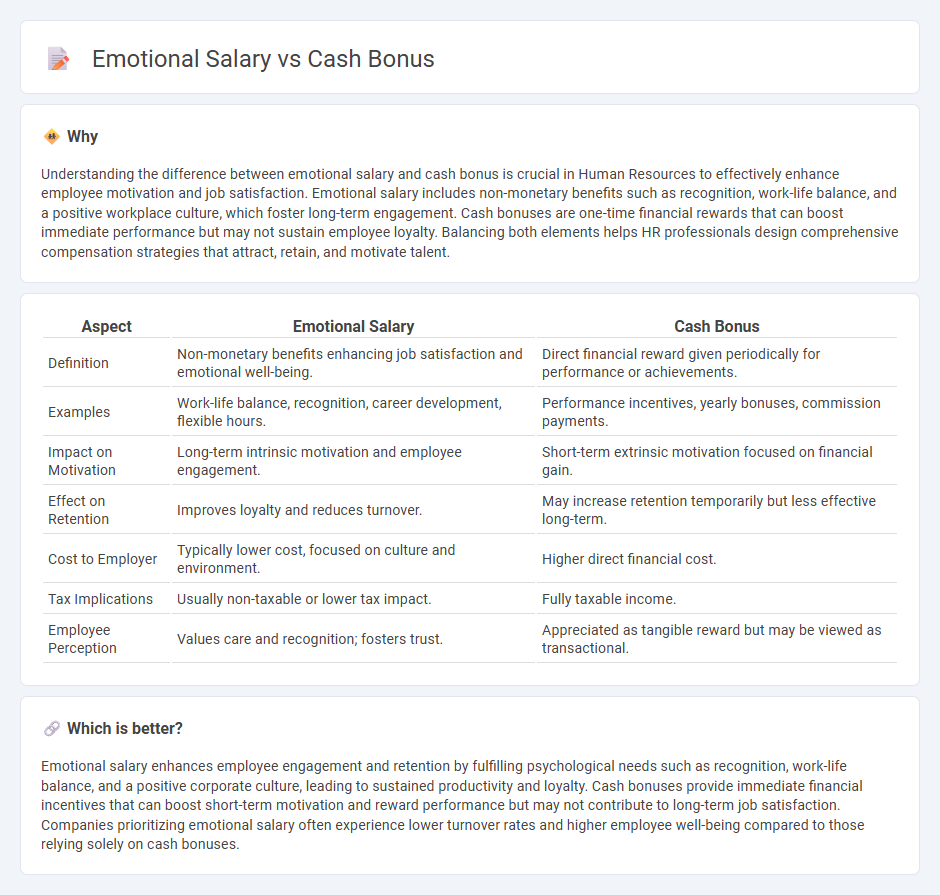
Emotional salary encompasses non-monetary benefits such as recognition, work-life balance, and job satisfaction that enhance employee motivation and loyalty. Cash bonuses provide immediate financial rewards tied to performance metrics, directly influencing short-term productivity. Explore how integrating emotional salary with cash bonuses can optimize workforce engagement and retention.
Why it is important
Understanding the difference between emotional salary and cash bonus is crucial in Human Resources to effectively enhance employee motivation and job satisfaction. Emotional salary includes non-monetary benefits such as recognition, work-life balance, and a positive workplace culture, which foster long-term engagement. Cash bonuses are one-time financial rewards that can boost immediate performance but may not sustain employee loyalty. Balancing both elements helps HR professionals design comprehensive compensation strategies that attract, retain, and motivate talent.
Comparison Table
| Aspect | Emotional Salary | Cash Bonus |
|---|---|---|
| Definition | Non-monetary benefits enhancing job satisfaction and emotional well-being. | Direct financial reward given periodically for performance or achievements. |
| Examples | Work-life balance, recognition, career development, flexible hours. | Performance incentives, yearly bonuses, commission payments. |
| Impact on Motivation | Long-term intrinsic motivation and employee engagement. | Short-term extrinsic motivation focused on financial gain. |
| Effect on Retention | Improves loyalty and reduces turnover. | May increase retention temporarily but less effective long-term. |
| Cost to Employer | Typically lower cost, focused on culture and environment. | Higher direct financial cost. |
| Tax Implications | Usually non-taxable or lower tax impact. | Fully taxable income. |
| Employee Perception | Values care and recognition; fosters trust. | Appreciated as tangible reward but may be viewed as transactional. |
Which is better?
Emotional salary enhances employee engagement and retention by fulfilling psychological needs such as recognition, work-life balance, and a positive corporate culture, leading to sustained productivity and loyalty. Cash bonuses provide immediate financial incentives that can boost short-term motivation and reward performance but may not contribute to long-term job satisfaction. Companies prioritizing emotional salary often experience lower turnover rates and higher employee well-being compared to those relying solely on cash bonuses.
Connection
Emotional salary, which includes non-monetary rewards such as recognition, career growth, and job satisfaction, complements cash bonuses by enhancing overall employee motivation and engagement. Combining emotional salary with cash bonuses creates a balanced compensation strategy that addresses both intrinsic and extrinsic motivators, leading to higher retention and productivity. Organizations leveraging this connection benefit from improved employee well-being and reduced turnover rates.
Key Terms
Compensation
Cash bonus provides immediate financial rewards directly impacting employee income and motivation, while emotional salary encompasses non-monetary benefits such as recognition, work-life balance, and job satisfaction that enhance overall well-being. Compensation strategies integrating both cash bonuses and emotional salary elements foster higher retention rates and employee engagement. Discover effective ways to balance these compensation components to optimize workforce performance.
Recognition
Recognition through emotional salary enhances employee motivation and loyalty by fulfilling psychological needs beyond monetary compensation. Unlike cash bonuses, emotional salary includes appreciation, meaningful work, and a positive company culture that boosts long-term engagement. Discover how integrating emotional salary with traditional rewards can transform your workplace dynamics.
Employee Engagement
Cash bonuses provide immediate financial rewards that motivate employees and enhance performance through tangible incentives. Emotional salary encompasses non-monetary benefits such as recognition, work-life balance, and meaningful workplace culture, fostering deeper employee engagement and long-term loyalty. Explore strategies to balance cash bonuses with emotional salary components for optimal employee motivation and retention.
Source and External Links
$600 Checking Account Bonus Offer - Huntington Bank - Offers cash bonuses up to $600 for opening new Huntington checking accounts and meeting direct deposit or deposit amount requirements by August 15, 2025.
HSBC Premier Relationship Account Offers - HSBC Bank USA - Provides up to $3,000 cash bonuses for opening an HSBC Premier checking account and completing qualifying activities including direct deposits, new money deposits, and mortgage application by September 30, 2025.
$460 Limited Time Checking Account Bonus Offer - BMO - Earn up to $460 cash bonus by opening new checking and savings accounts with qualifying deposits within 90 days starting May 2025.
 dowidth.com
dowidth.com